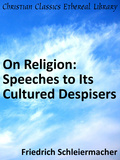Bible Knowledge Graph
On Religion: Speeches to Its Cultured Despisers
- Entity ID:
- on-religion-speeches-to-its-cultured-despisers-(schleiermach)
- Long Name:
- On Religion: Speeches to Its Cultured Despisers
- Short Name:
- On Religion: Speeches to Its Cultured Despisers
- Disambiguation String:
- five speeches on religion
- Entity Type:
- work
- Entity Subtype:
- book
-

- Summary:
- Young Friedrich
Schleiermacher was a Reformed Calvinist Chaplain in Berlin when he wrote
his first major work, On Religion: Speeches to Its Cultured
Despisers.
Comprised of five speeches on religion, Schleiermacher's book was
largely influenced by several rationalist philosophers that
Schleiermacher had studied. Schleiermacher argued that religion was
rooted in human feelings, describing the core of religion as "a sense
and taste for the Infinite in the finite." He understood religion as the
human effort to communicate our experienced consciousness of the Divine
within the human social sphere. As a result of his analysis,
Schleiermacher was sensitive to the limitations of religion in the
finite realm. The emergence of this book in 1799 marked the beginning of
the era of Protestant Liberal Theology, and it offered a method of
understanding religion that was refreshing for Schleiermacher's
time.
Emmalon Davis
CCEL Staff Writer - DB Pedia ID:
- On_Religion
- Is An Individual:
- No
- Is Published:
- Yes
- Original Language:
- eng
- ISBN:
- 9781610251976
- CCEL URL:
- LC Subjects:
- All;
- Creators:
- Creator: Friedrich Schleiermacher, Relator: aut, Creator ID: 15820
//ccel.org/ccel/schleiermach/religion.html
